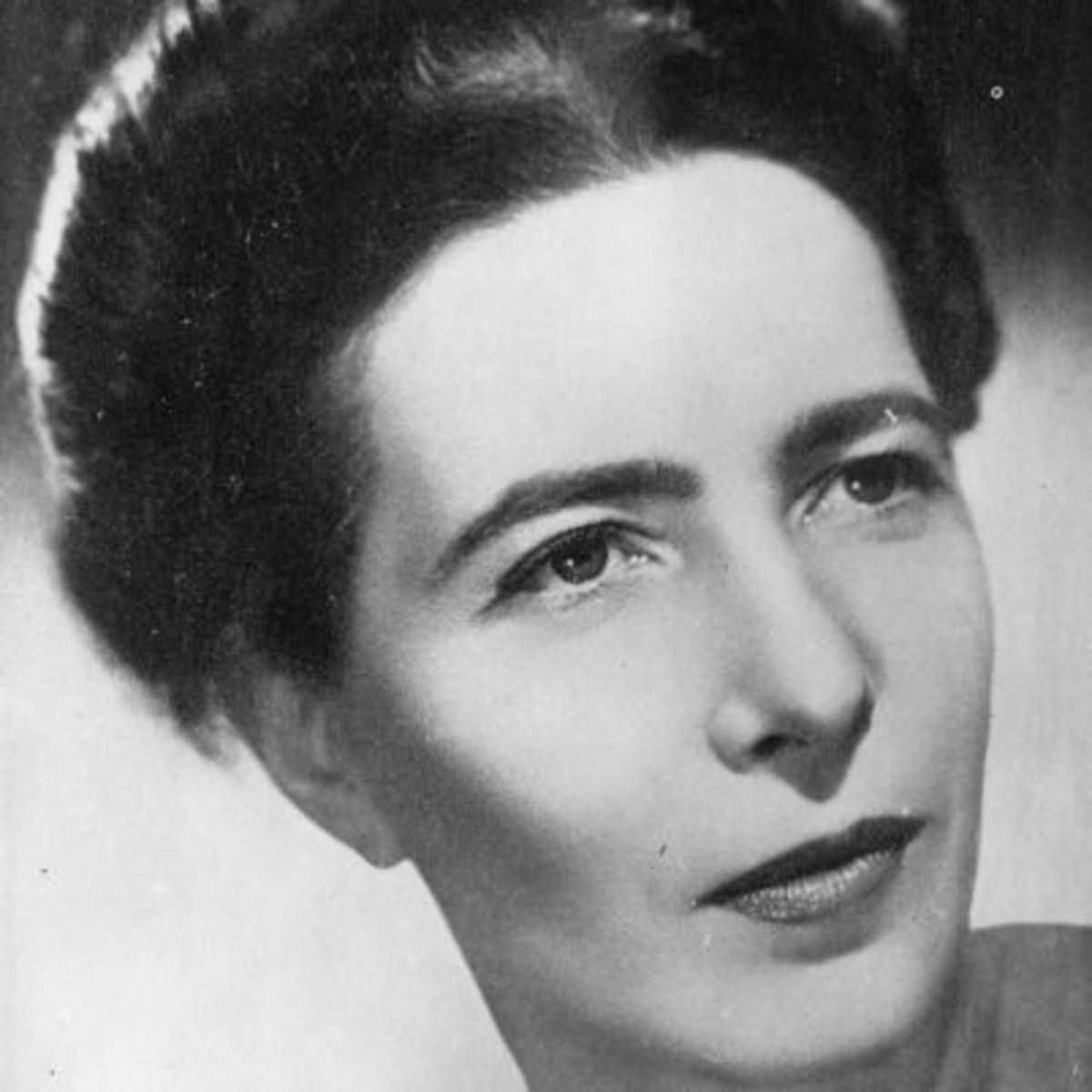Simone De Beauvoir
The Second Sex
One Is Not Born, But Rather Becomes, A Woman
Simone de Beauvoir - An Overview
Simone de Beauvoir (9 January 1908 – 14 April 1986) was a French writer, intellectual, existentialist philosopher, political activist, feminist, and social theorist.
She was born into a bourgeois Parisian family. Her father, Georges Bertrand de Beauvoir was a legal secretary who once had aspirations to be an actor, and her mother Françoise Beauvoir (née Brasseur), was a wealthy banker's daughter and devout Catholic.
Simone de Beauvoir described the impact of her parents in her autobiographical "Memoires Of A Dutiful Daughter":
"...my father's individualism and pagan ethical standards were in complete contrast to the rigidly moral conventionalism of my mother's teaching. This disequilibrium, which made my life a kind of endless disputation, is the main reason why I became an intellectual."
She also describes her student days at the Sorbonne, where she met the man who was become her lifelong companion in, what for the times, was a most unconventional open relationship.
That man was Jean Paul Sartre - "the dream-companion I had longed for since I was fifteen".
Simone de Beauvoir wrote novels, essays, biographies, autobiographies and monographs on philosophy, politics, and social issues.
Despite not considering herself a philosopher, she had a significant influence on both feminist existentialism and feminist theory read, discussed and critiqued Sarte's written output.
Simone de Beauvoir - "The Second Sex"
During her lifetime, her philosophical
writings were viewed as echoes of Sartre rather than seen as her own
unique contribution. The sexism of the time presumed that it was only
“natural” to think
of a woman as a disciple of a male companion.
It was also felt fact that because she wrote about women in her 1949 treatise "The Second Sex",
providing a detailed analysis of women's oppression and a foundational
tract of contemporary feminism, this did not count as philosophy. Yet
now it is regarded as as one of the hundred most important works of the
twentieth
century.
Simone de Beauvoir would have enjoyed her current revised philosophical status in the way that it reflects our changed understanding of the domain of philosophy and the changed understanding of what it means to be a women.
She may also have appreciated the way in which her
works was instrumental in effecting these changes, and its lasting impact is a tribute to the ways that others have taken up her
philosophical and feminist legacies.
Beauvoir believed that the success of our projects [our conscious free choices] depends on the extent to which they are adopted by others.
Resources:
The academic view of Simone de Beauvoir
Introduction to Simone de Beauvoir’s ‘The Second Sex’:
The academic view of existentialism:
Stanford University Encyclopedia Of Philosophy
Return to: Existentialism
LATEST ARTICLES
Master The Season You Are In - The Key to Fulfilling Your Purpose
 To fulfil your purpose, you must first master the season you are in. One of the biggest mistakes you can make in life is focusing all your energy on the next season instead of learning to master the s…
To fulfil your purpose, you must first master the season you are in. One of the biggest mistakes you can make in life is focusing all your energy on the next season instead of learning to master the s…The Inner Weight of Shame - Sustained By Attentional Fixation
 A Mind That Is Continuously Engaged In Self-Surveillance. Shame is one of the heaviest inner burdens a human being can carry. It does not announce itself loudly or demand attention through drama. Inst…
A Mind That Is Continuously Engaged In Self-Surveillance. Shame is one of the heaviest inner burdens a human being can carry. It does not announce itself loudly or demand attention through drama. Inst…Does Prayer Work? The Psychology of Prayer, Meditation and Outcomes
 Reality Is A Complex System Of Countless Interactions - Including Yours. So does prayer work? The problem is that the question itself is usually framed in a way that guarantees confusion. We tend to a…
Reality Is A Complex System Of Countless Interactions - Including Yours. So does prayer work? The problem is that the question itself is usually framed in a way that guarantees confusion. We tend to a…Living in Survival Mode Without Surrendering Mental Authority
Living in Survival Mode Without Surrendering Mental Authority
 Clear Thinking When You’re Just Trying to Stay Afloat. Many people today are overwhelmed because they are living in survival mode - not temporarily, but as a persistent condition of life. For many, th…
Clear Thinking When You’re Just Trying to Stay Afloat. Many people today are overwhelmed because they are living in survival mode - not temporarily, but as a persistent condition of life. For many, th…Manifestation Without Magic: A Practical Model
 Manifestation without magic is not a softer or more intellectual version of popular manifestation culture. It is a different model altogether. Popular manifestation teachings tend to frame reality as…
Manifestation without magic is not a softer or more intellectual version of popular manifestation culture. It is a different model altogether. Popular manifestation teachings tend to frame reality as…Staying Committed When You Can't See Progress - The Psychology of Grit
 Uncertainty Is Not The Absence Of Progress, Only The Absence Of Reassurance. One of the most destabilising experiences in modern life is not failure, but uncertainty and staying committed when you can…
Uncertainty Is Not The Absence Of Progress, Only The Absence Of Reassurance. One of the most destabilising experiences in modern life is not failure, but uncertainty and staying committed when you can…The Battle For Your Mind - How To Win Inner Freedom In A Digital Age Of Distraction
 From External Events to Inner Events. We often think of “events” as things that happen out there: the traffic jam, the rude comment, the delayed email reply. But what truly shapes our experience is wh…
From External Events to Inner Events. We often think of “events” as things that happen out there: the traffic jam, the rude comment, the delayed email reply. But what truly shapes our experience is wh…How to See Your Thoughts Without Becoming the Story
 A Practical Guide to Thought-Awareness. You can spend your life inside the stories of your mind without ever learning how to see your thoughts clearly and objectively. Most of the stuff we tell oursel…
A Practical Guide to Thought-Awareness. You can spend your life inside the stories of your mind without ever learning how to see your thoughts clearly and objectively. Most of the stuff we tell oursel…The Collison Decision Matrix - A Simple Framework for Better Choices
 The Collison Decision Matrix Is A Practical Everyday Thinking Tool. Most of us spend a surprising amount of time worrying about decisions. From small ones such as what to wear, what to eat, what to te…
The Collison Decision Matrix Is A Practical Everyday Thinking Tool. Most of us spend a surprising amount of time worrying about decisions. From small ones such as what to wear, what to eat, what to te…The Power Of Asking The Right Question
 The Power Of Asking The Right Question Lies In The Quest For Insight. To experience the power of asking the right question you must develop the practice of asking questions. The best way to improve th…
The Power Of Asking The Right Question Lies In The Quest For Insight. To experience the power of asking the right question you must develop the practice of asking questions. The best way to improve th…Site Pathways
 Here is a site pathway to help new readers of Zen-Tools navigate the material on this site. Each pathway is based around one of the many key themes covered on this site and contain a 150 word introduc…
Here is a site pathway to help new readers of Zen-Tools navigate the material on this site. Each pathway is based around one of the many key themes covered on this site and contain a 150 word introduc…
